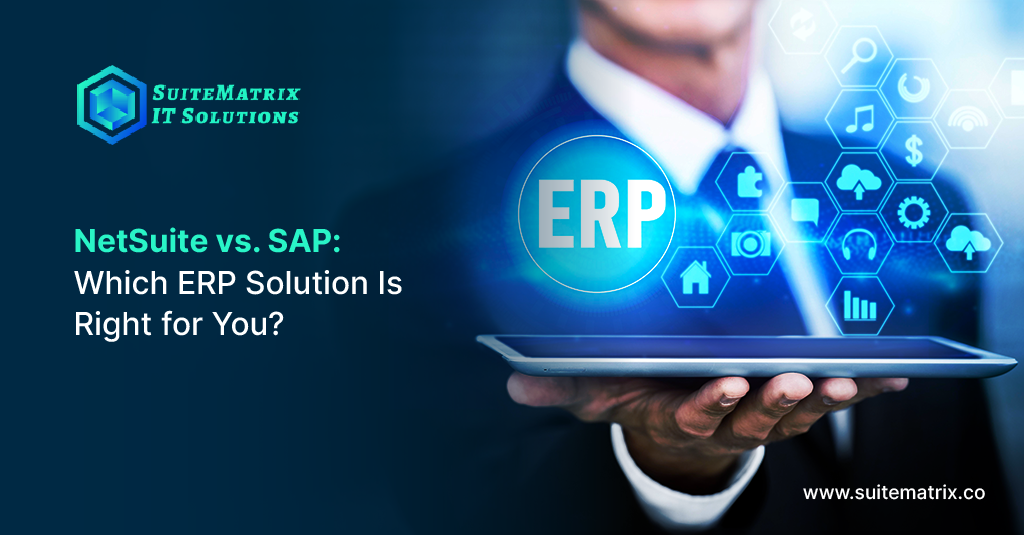Having a robust Enterprise Resource Planning (ERP) system is critical to staying competitive. ERP software helps businesses streamline operations, improve efficiency, and provide a unified system for various departments such as finance, HR, and supply chain. According to Gartner, the ERP market is expected to grow by 7.1% annually, reaching $78.40 billion by 2026, making the selection of the right ERP solution more important than ever.
Among the top ERP solutions, NetSuite and SAP stand out as two of the most widely adopted systems. Each has its own strengths, weaknesses, and ideal use cases.
What Is NetSuite?
NetSuite ERP, a cloud-based ERP solution owned by Oracle, is specifically designed to cater to small and mid-sized businesses. Known for its flexibility, scalability, and ease of use, NetSuite offers an all-in-one solution for financial management, CRM, e-commerce, and inventory management. One of the key advantages of NetSuite is its cloud-native structure, making it highly adaptable and accessible from anywhere in the world.
Key Features of NetSuite
- Cloud-based with real-time data access
- Highly customizable for small to mid-sized businesses
- Integrated CRM, e-commerce, and finance solutions
- Fast deployment and user-friendly interface
What Is SAP?
SAP, short for Systems, Applications, and Products, is a comprehensive ERP solution mainly targeting large enterprises. SAP’s ERP solutions offer extensive functionalities that cover not just basic business processes but also complex workflows and regulatory compliance. SAP’s strength lies in its deep industry-specific capabilities, making it ideal for large-scale organizations operating in multiple geographies.
Key Features of SAP
- Tailored for large enterprises with complex needs
- Robust analytics and reporting tools
- Strong industry-specific solutions
- Comprehensive on-premises and cloud deployment options
NetSuite vs. SAP: A Detailed Comparison
| Feature | NetSuite | SAP |
| Target Audience | Small to mid-sized businesses | Large enterprises |
| Deployment | Cloud-based | On-premise, cloud, and hybrid options |
| Ease of Use | User-friendly interface, easy to deploy | More complex, steep learning curve |
| Customization | Highly customizable with rapid configurations | Extensive customization but complex |
| Industry Specialization | Generalist ERP suitable for various industries | Strong industry-specific modules (e.g., Manufacturing, Retail, etc.) |
| Cost | Lower initial cost, subscription-based pricing | Higher cost, suited for larger budgets |
| Scalability | Scales easily with growing businesses | Designed for large, complex organizations | |
| Integration | Seamless integration with other Oracle products | Extensive integration capabilities, especially with SAP systems |
| Support and Resources | Strong online resources, limited compared to SAP | Extensive global support and resources |
| Implementation Time | Faster implementation (typically 3-6 months) | Longer implementation time (6-18 months) |
Other Aspects to Consider
- Deployment Options: NetSuite ERP is entirely cloud-based, making it easier to deploy and requires less hardware and IT resources. SAP, on the other hand, offers both cloud and on-premises deployment, giving businesses more flexibility in how they manage their infrastructure.
- Customization and Flexibility: NetSuite is known for being highly customizable, especially for small and mid-sized businesses. Its modular structure allows companies to pick and choose which functionalities they need. SAP, while also customizable, is much more complex due to its broad range of industry-specific modules, which can be a double-edged sword for businesses seeking flexibility.
- Scalability: Both solutions are scalable, but they serve different scales of business. NetSuite is ideal for growing small and mid-sized companies, while SAP is built for large enterprises with more intricate needs.
- Cost and Pricing: NetSuite typically has a lower upfront cost, with a subscription-based pricing model that makes it accessible for small to medium businesses. SAP, due to its advanced capabilities and tailored solutions for large enterprises, comes with a higher price tag, including long-term maintenance and operational costs.
- Implementation Time: NetSuite’s cloud-based architecture allows for faster implementation, usually within a few months. SAP, because of its complexity and customization options, requires longer implementation times, often stretching to a year or more for larger enterprises.
- Support and Training: SAP, being an older and larger company, offers more extensive support and resources globally, making it easier for large enterprises to find training and implementation partners. NetSuite has a strong support structure but is more limited in comparison.
Conclusion
Choosing between NetSuite ERP and SAP depends on your organization’s size, complexity, and industry requirements. If you’re a small to mid-sized business looking for a flexible, easy-to-deploy, and cost-effective ERP solution, NetSuite might be the right choice. On the other hand, if you are a large enterprise with complex needs, multiple divisions, and a global presence, SAP could be the better fit due to its robust industry-specific functionalities and scalability.
Evaluate your business’s current needs, long-term goals, and available resources before making a decision. Both NetSuite and SAP are industry leaders, but their ideal applications differ based on the size and complexity of your operations. SuiteMatrix is the ideal NetSuite partner, delivering comprehensive solutions that streamline operations, drive growth, and maximize business efficiency with expert implementation and support. Connect with us today!



